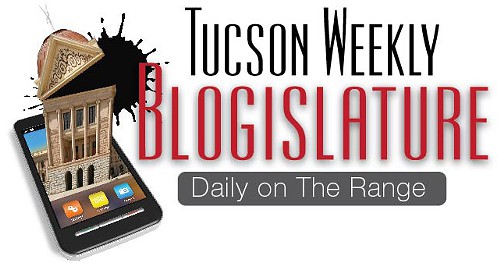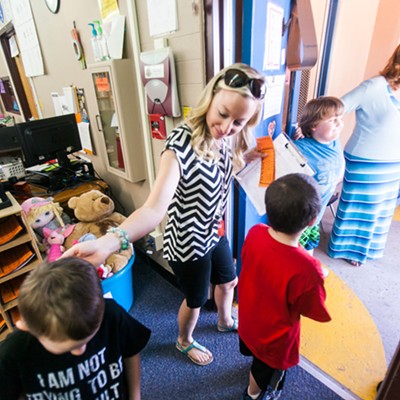Monday, January 21, 2013
State Sen. Dave Bradley: "Arming People in Schools, I Think You're Just Asking for Trouble"

Education is going to be one of the big issues this session. Our education system is currently pretty beat up in terms of funding; higher education is getting more expensive, school districts are getting less money than they were a few years ago, Proposition 204 failed at the ballot box. How do you see the next term addressing these problems?
I don't see a lot more funding coming in this round. I think we may have to wait until the next session before we get to that crisis level, I think, before the legislature might do anything, because the folks that are running the show believe that there isn't the resources to increase funding for anything, let alone education—or healthcare, for that matter. It'll take getting to crisis level for them to do anything.
Do you think that the Democrats could work with Governor Brewer to gain leverage for education funding?
I think there's some hope, because of the makeup of the Senate, of getting anything out of there. We're hopeful that a couple of the Republican members aren't so beholden, you know, to the cause. If that happens, it'll force some negotiation, and in some ways, that's our only hope. The House, on the other hand, is pretty much going to fall along party lines, as far as we know, unless some of the new members surprise us. There might be some hope there. Generally though, if there's any hope for anything, it's going to be with a divided Senate.
Gun control has been a really hot topic in the media lately. From Newtown to Portland to Aurora, and even in our own city, we've seen many mass shootings lately. Arizona, of course, has pretty loose gun laws. Do you see any possibility of, maybe, tightening up our gun laws, or enforcing existing laws more stringently?
The only thing that might happen is that we can stops any more attempts to loosen it up, beyond what it already is. I don't think there's going to be the ability in the legislature to reverse any of the recent decisions, especially with the concealed weapons and all of that. I'd be somewhat surprised if we see a push for even higher access to guns, but I think that the best thing that could happen is that we don't make it worse and try to hold the line. I don't think there's much opportunity to reverse any previous decisions.
I don't know if you've heard any of these proposals, but around the country a lot of Republican lawmakers have been pushing to arm faculty and staff at schools, and I believe we've also heard rumblings about that here in Arizona. How do you feel about that?
I think it's pretty ridiculous. School districts have to figure this out and look at their facilities, figure out the structural things they can change to make their school districts safer, and look at it from that perspective. Arming people in schools, I think you're just asking for more trouble. Particularly at the higher level, middle school and high school, with a teacher in a classroom and the kids knowing about the gun in the classroom, I don't think that would work out very well. There's merit in school resource officers, but they can't just throw people in there just because they have law enforcement experience and expect them to be able to operate in a school setting. It takes training, because dealing with kids is a profession, just likely any profession, and it doesn't come intuitively necessarily. There's training for those folks and there's some merit in that. Resources officers in some parts of the country do very, very well, but in other parts not so much, and if they don't have that training more people ended up arrested, and particularly kids of color end up being arrested more, and there's a whole host of issues that need to be thought through, so that the resource officer doesn't turn into the main disciplinarian of the school, and decisions aren't made to quickly yank the kid out, whereas before we would try to process what was going on with that child and bring the family in and come to better solutions.
You spent eight years in the State House, and that likely means that you've dealt with your fair share of legislators on the other side. Although the Republican supermajority is no longer, you'll still be facing Republican majorities in both houses. Do you think that there are any issues where the two sides can come together, especially given the long-standing divide?
I've said for ten years that the core issue — bigger than education, bigger than healthcare, bigger than social welfare — is tax reform because you can't plan ahead until you have a stabilized system that brings resources into the state. And with what we've gone through in the past three or four years, there's a greater appreciation of that. I don't think, by any means, that there'll be dramatic changes in that regard, but there's at least an opportunity to start discussing it. It may take a few sessions for it to be hammered through, but I'm a little bit optimistic about that. There's also the issue of spending reform, although of course Democrats don't like to look at that issue, but particularly in regards to the correctional system, I think there's enormous opportunity for savings. If we look at modifying mandatory sentencing, I think that there's opportunity there. We're on an unsustainable course [with regard to the correctional system]. We lock up about one percent of the adults in this state, and we're on a pace where if we continue on this path, we'll be locking up one-and-a-half to two percent of the adults in the state in the next ten to fifteen years. It's ludicrous.
Do you think that the private prison system contributes to this problem?
I don't think it helps. If you're running a private prison, you have other motivators — you're trying to keep your census up, you're trying to keep your investors happy, and there's the liability that the private prisons bring to the state. If anything bad happens, the state is left holding the bag. I'm not in favor of increasing them by any means, and I think, over time, if we can do some realistic reform, we can actually cut the number of beds. We spend so much, you know, ninety percent of the corrections funding goes to prisons, but the majority of the people who are in the judicial system are out of prison. Very little money goes to sustaining that system, to keeping people out. So we end up with this revolving door, where 60 percent of people who come out go back in within a couple of years. We're not doing anything, but we have to, if only because of the fiscal situation. Some of the stuff we're doing is just ludicrous, like with the "three strikes and you're out" rule, or law as it were, where we end up with these ridiculously long sentences for some of these crimes that, in my mind, don't warrant it, and don't have any public safety issue at play, so we end up using all of our resources in that regard instead of investing wisely in prevention.
Going back to what you said about taxes, it seems to me that's there's a really interesting issue at play. Much of the criticism of Proposition 204 was that sales isn't a stable revenue source for schools. What do you think would be a more suitable source of funding?
Well what we have in terms of taxes is a three-legged stool, with property tax, income tax, and sales tax. The most stable of those is the property tax, and there isn't really a state property tax. There was a little bit of one, but it was cut off some time in the nineties, and we've had tax cuts since the early nineties that total almost $3 billion per year, and so what we do, we keep trying to keep various folks happy by doing deductions and credits or whatever, and we just bastardize the system so badly that, when we're in crisis, all we can manipulate the sales tax. Obviously, we can't manipulate that infinitely, or we'd up with a 20 or 30 percent sales tax. The second most stable would be the income tax, and the Arizona income tax is one of the lowest in the nation, so there has to be more reliance on that. The property tax is more complicated because the state doesn't do property tax, and as a result, fire districts and school districts and all kinds of special hospital districts rely on property tax, so if you were to yank all of that away, and put it all into the state coffers, it would be a difficult thing to do. But I think that there is opportunity there if we do it right. We've got to get off the reliance solely on sales taxes though.
Tags: David Bradley , taxation , gun control , education , armed faculty , private prisons















